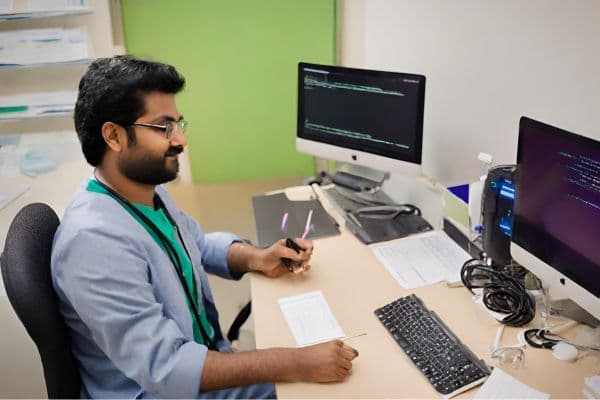The Essential Role of AI Proficiency for Modern Healthcare Practitioners

Abstract
In today's dynamic healthcare landscape, doctors must stay updated with advancements in artificial intelligence (AI) to optimize patient care. AI holds immense potential to enhance diagnostic accuracy, treatment planning, and administrative tasks. However, integrating AI into medical practice presents challenges such as data privacy concerns and the need for continuous education. Proficiency in AI is increasingly vital for modern healthcare practitioners, necessitating ongoing training and resources. Medical institutions and professional organizations play a crucial role in providing education and support. By embracing AI proficiency, doctors can leverage these technologies to improve patient outcomes and drive innovation in the field of medicine.The impact of AI on every aspect of life is undeniable today, affecting every profession in some way. Healthcare, in particular, stands out as a field that will undergo significant change due to AI. One recent and noteworthy development is the FDA's approval for the initiation of human trials for Neuralink, a technology aimed at integrating AI into the human brain. This approval underscores the immense impact that AI and emerging technologies will have in the near future, with changes that may be unimaginable in everyday human life. For more information on brain-computer interfaces, you can refer to articles discussing this topic.
The term "AI" encompasses a broad range of technologies and techniques, with machine learning being one of its key components. Machine learning utilizes various methods, with one notable approach being neural networks, which can further be categorized into deep learning. These technologies enable machines to learn from data and perform tasks that typically require human intelligence.
What is Deep Learning?
I want to focus on deep learning here as it is most relevant to healthcare. Deep learning deals with neural networks. While traditional computer programming is deterministic, AI is predictive. Models created by training the data learn how to predict the needed result. In traditional programming, programs are written explicitly to meet all the rules in question.
Deep learning, at its core, involves matrix manipulation learned in linear algebra before joining MBBS. Now, let's delve deeper into how deep learning operates within neural networks. Every input into the neural network can be represented as numbers inside matrices. Data is processed through multiple layers of interconnected nodes, each performing computations on the input data, often involving matrix operations. During the training process, the neural network adjusts its internal parameters, known as weights and biases, to minimize the difference between its predicted output and the actual output labeled in the training data. This adjustment involves manipulating the matrices associated with the data and the network's parameters. Through iterative adjustments based on the training data, the network learns to generate appropriate weights and biases that enable it to make accurate predictions or classifications. Overall, this process of matrix manipulation and adjustment of weights and biases lies at the heart of how neural networks learn from data and make predictions in deep learning.
Medico-legal Aspect
As of now, the onus of error lies with doctors if AI gives wrong predictions and patients suffer. However, with gradual improvement and AI becoming more efficient, there may be a future when AI will be able to give better opinions than doctors alone. Doctors may have to augment their decisions using AI, leading to modifications in legal implications. This is for the future.
BCI is also meant to play a significant role in AI-augmented decision-making for healthcare. This will open new challenges of hacking the human brain, akin to websites of today.
Will Doctors Get Replaced?
The tomorrow that may come is difficult to predict. It is estimated that 80% of jobs or professions that may arise have not even been thought of yet. This means the medical profession as we know it may become a thing of the past. This is not just limited to the medical profession but applies to every profession.
Just imagine intelligence sharing by BCI becoming real. The impact could be profound; we could learn advanced maths just by plugging in. A mathematician could learn to be a doctor too.
As per the prediction of Dr. Neil deGrasse Tyson, a physicist, by 2050, most psychiatric illnesses will be cured. The scope of BCI in psychiatric illness is tremendous. This is supposed to say how we can change our medical practice.
Can Doctors Learn AI?
The simple answer is yes. I personally feel that you can pick it up with a little bit of training. There are many online courses available. I suggest FreeCodeCamp and Krish Naik's YouTube channel. Learn Python, a programming language, and PyTorch, a deep learning library. You don't need an expensive computer; you can use your laptop with a Gmail account and utilize Google Colab to learn AI.
Learning Python may take about 4 weeks, and learning Deep Learning may take 5 to 8 weeks. Don't delve too deeply into the math part; you can learn while doing so. While watching YouTube videos, write code in parallel to get a real hang of it and gain confidence. Please note that there are many scam courses trying to sell doctors on AI. Don't get scammed by them. I want to emphasize that you don't need expensive online courses to learn deep learning and Python. This is from my personal experience.
Conclusion:
In conclusion, the integration of deep learning in healthcare represents a paradigm shift in medical practice. As AI technologies continue to evolve, they bring both promises and challenges. From improving diagnosis accuracy to personalized treatment recommendations, deep learning holds the potential to revolutionize patient care. However, ethical and legal considerations, such as accountability for AI errors and data privacy, must be addressed. Despite these challenges, the future of medicine appears increasingly intertwined with AI, offering unprecedented opportunities for innovation and advancements in healthcare delivery. By embracing AI technologies responsibly and equipping healthcare professionals with the necessary skills, we can harness the full potential of deep learning to enhance patient outcomes and shape the future of healthcare.
This Unlock the Future of Healthcare Management! 🚀🏥🌟
Is managing your hospital, clinic, or lab becoming a daunting task? Experience the ease and efficiency of our cutting-edge Management Software through a personalized demo.
